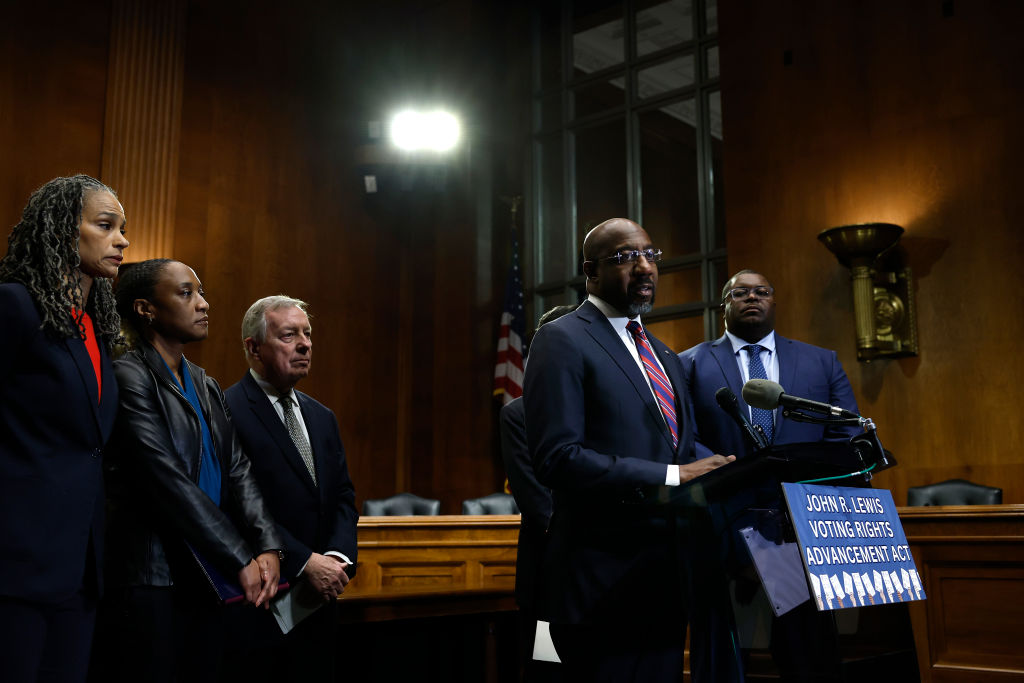Senate Democrats Reintroduce John Lewis Voting Rights Act Ahead Of Bloody Sunday Anniversary
Sen. Raphael Warnock (D-GA) speaks at a news conference on the reintroduction of the John R. Lewis Voting Rights Advancement Act in the Senate Dirksen Office Building on February 29, 2024, in Washington, D.C. | Source: Anna Moneymaker / Getty
Senate Democrats on Thursday reintroduced key voting rights legislation that would restore key provisions that undermine Republicans’ efforts to decrease access to the ballot, particularly for Black voters.
The John R. Lewis Voting Rights Advancement Act was reintroduced a little more than a week before the 59th anniversary of “Bloody Sunday,” protest marches in the small Alabama town of Selma with the intent of combating white resistance toward African Americans gaining the right to vote in elections.
MORE: Black Voters Matter Announce ‘We Fight Back’ Campaign & Bus Tour For The 2024 Election Season
Georgia Sen. Raphael Warnock was joined by New Jersey Sen. Cory Booker, California Sen. LaPhonza Butler, Illinois Sen. Dick Durbin and Connecticut Sen. Richard Blumenthal in reintroducing the John R. Lewis Voting Rights Advancement Act, which has failed to advance in Congress multiple times and would restore and expand provisions of the 1965 Voting Rights Act gutted by previous Supreme Court decisions.
“I was Congressman Lewis’ pastor, but he was my mentor and hero because he believed voting is a sacred undertaking that’s about more than a person’s voice, it’s about their humanity,” Warnock said in reintroducing the bill. “That’s why this legislation is more important than ever, because the fight to protect voting rights and voting access for every eligible American remains unfinished and even worse, so much of the progress Congressman Lewis fought for is being rolled back.”
The John R. Lewis Voting Rights Advancement Act
First introduced in 2019, the bill was renamed for Lewis shortly after the legendary Georgia Congressman died in 2020. It passed in the House in 2021 before languishing as the U.S. Senate did not move it beyond the debate stage.
Since then, the legislation has been at a standstill.
Civil rights leaders and groups hailed the Senate Democrats for reintroducing the bill at such a crucial moment, not just in history but also in an election year.
“The NAACP is proud to support Senator Warnock’s reintroduction of the John Lewis Voting Rights Advancement Act bill. Right now, Americans, particularly Black Americans’ right to vote is under attack,” NAACP President and CEO Derrick Johnson said in a statement emailed to NewsOne.
Johnson continued: “The reintroduction of this bill marks another pivotal moment in the fight to ensure every American has access to the ballot box. We know that democracy can’t exist without the Black vote. Now, it’s up to our leaders to protect it, ensuring that every voice is heard, and every vote counted. Together, we’ll repair democracy.”
Bloody Sunday
The significance of the timing – just before the Bloody Sunday anniversary – that the John Lewis Voting Rights Advancement Act was reintroduced should not be lost on people.
The historic “Selma to Montgomery marches,” the first of the three protest marches known as “Bloody Sunday,” took place 59 next week and highlighted a turbulent time of the Civil Rights Movement of the 1960s. The Student Nonviolent Coordinating Committee (SNCC) led voter registration drives in Selma.
This year’s anniversary marks the fourth time in the march’s history that it will take place without several of its founding organizers. That includes the legendary John Lewis, the Rev. Joseph Lowery, the Rev. C.T. Vivian and attorney Bruce Boynton. All four of those civil rights icons died in 2020.
Along with Dr. Martin Luther King Jr. and the Southern Christian Leadership Conference (SCLC), the gathering of activists held several demonstrations to protest the death of fellow protester Jimmie Lee Jackson who was shot and killed by Alabama State Trooper James Bonard Fowler.
On March 7 of that year, more than 600 hundred people led by the SNCC and SCLC gathered in Selma to march in solidarity. Coupled with the original aim of the protest, marchers also wanted to call attention to the denial of their voting rights. With the 1964 Civil Rights Act passing, King and other leaders hoped the gathering would speed along the opportunity for fairness.
Led by Lewis, who was chairman of the SNCC at the time, and Rev. Hosea Williams of the SCLC, the marchers were undeterred until they reached the Edmund Pettus Bridge that crosses the Alabama River heading into Montgomery.
Alabama police prevented the marchers from moving forward once they crossed the bridge, prompting shoving matches before officers fired tear gas into the crowd and began beating the nonviolent protesters with billy clubs.
Defiantly, Dr. King roused nationwide support for the following march known as “Turnaround Tuesday” and returned to Selma on March 9 of that year.
Weeks later on March 21 and under federal protection, a massive group of 8,000 marched successfully to Montgomery and were met with a “Stars For Freedom” rally, featuring Sammy Davis, Jr., Harry Belafonte, Tony Bennett, Nina Simone and more.
It would be several months until the Voting Rights Act Of 1965 would pass in August of that year, solidifying that the SNCC’s and SCLC’s hard work was not in vain.
But some of the protections in the Voting Rights Act Of 1965 have since been rolled back, prompting the dire need for the John Lewis Voting Rights Advancement Act to be enacted into law.
This is America.
SEE ALSO:
Louisiana Becomes Latest State To Create New Majority-Black Voting District
Voter Purges Are Increasing Across The South. We Must Put A Stop To The Practice
The post Senate Democrats Reintroduce John Lewis Voting Rights Act Ahead Of Bloody Sunday Anniversary appeared first on NewsOne.

